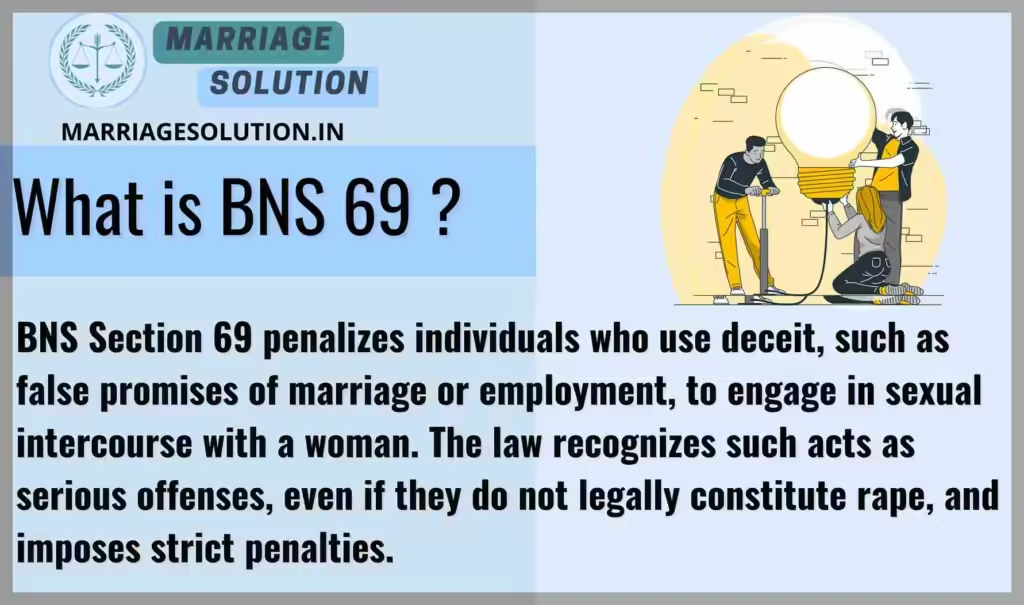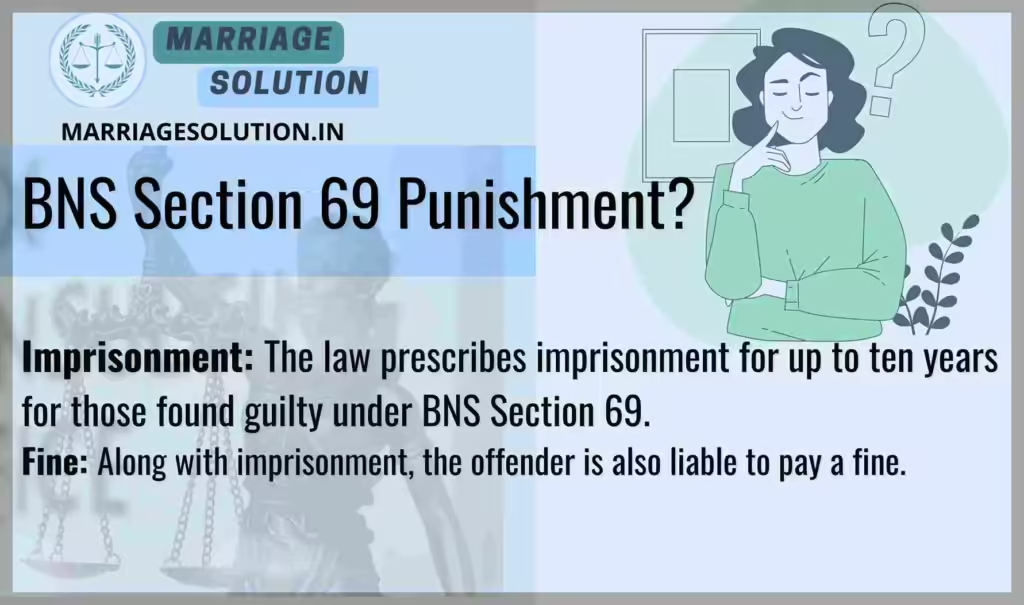Introduction of Section 69 BNS
Section 69 BNS plays a crucial role in protecting women from exploitation through deceitful means such as false promises of marriage, employment, or promotion. The law ensures that consent obtained under fraud or dishonesty is not treated as genuine consent. By prescribing imprisonment of up to 10 years along with fines, the section emphasizes the seriousness of such offences. It is a cognizable, non-bailable, and non-compoundable offence, ensuring strict legal action and preventing misuse. This provision reflects the Bharatiya Nyaya Sanhita’s commitment to safeguarding women’s dignity and autonomy from manipulative practices.
- Introduction of Section 69 BNS
- What is section 69 of BNS ?
- BNS Section 69 in Simple Points
- Section 69 BNS Overview
- BNS 69 Punishment
- BNS 69 bailable or not ?
- Bharatiya Nyaya Sanhita Section 69
- BNS Section 69 FAQs
- If you need support with court proceedings or any other legal matters, don’t hesitate to reach out for assistance.
What is section 69 of BNS ?
BNS Section 69 penalizes individuals who use deceit, such as false promises of marriage or employment, to engage in sexual intercourse with a woman. The law recognizes such acts as serious offenses, even if they do not legally constitute rape, and imposes strict penalties.

Section 69 Bharatiya Nyaya Sanhita
BNS Section 69 criminalizes sexual intercourse obtained by deceitful or dishonest means, such as making false promises of marriage, employment, or promotion, with no genuine intention to fulfill them. It ensures that consent based on lies is not considered valid and punishes offenders with imprisonment and fine.
This provision corresponds broadly to provisions under the IPC relating to cheating and sexual exploitation, but under the Bharatiya Nyaya Sanhita (BNS), 2023, it has been specifically structured to address deceit in sexual relationships.
1. Meaning of Section 69
BNS Section 69 applies when:
- A man engages in sexual intercourse with a woman by employing deceitful means.
- Deceit includes false promises of marriage, job, or promotion, or concealing one’s true identity (e.g., pretending to be unmarried).
- Even if the woman consents, the law treats such consent as invalid when obtained through fraud.
- The offence is recognized even though it does not strictly fall under the definition of rape (BNS Section 63).
2. Purpose of Section 69
The objective of this section is to:
- Protect women from exploitation through false assurances and manipulation.
- Ensure that dishonest men cannot misuse a woman’s trust to gain sexual favors.
- Close a legal gap where deceitful sexual exploitation was earlier treated only as cheating under IPC, with lighter punishments.
- Strengthen accountability by treating such conduct as a serious sexual offence.
3. Essential Ingredients of Section 69
For the offence under Section 69 to apply, the following must be present:
- Sexual intercourse took place.
- Consent of the woman was obtained.
- Consent was induced by deceitful means – false promises, lies, or concealment of facts.
- The accused never intended to fulfill the promise at the time it was made.
4. Punishment under BNS Section 69
- Imprisonment – Rigorous imprisonment for up to 10 years.
- Fine – In addition to imprisonment, the offender is also liable to pay a fine.
- The seriousness of the punishment shows that the law treats this offence at par with other major sexual crimes.
5. Examples of Section 69 in Action
- False Promise of Marriage: A man convinces a woman to enter into a sexual relationship by promising marriage but had no intention of marrying her.
- Job Offer Scam: A person falsely assures a woman of a job or promotion in exchange for sexual favors.
- Concealing Marital Status: A married man pretends to be single and enters into sexual relations under this false claim.
- Identity Deception: A man hides his true identity (religion, status, background) to induce consent.
6. Legal Nature of the Offence
- Cognizable – Police can register FIR and arrest without a warrant.
- Non-Bailable – Bail is not a matter of right; it depends on court discretion.
- Non-Compoundable – Cannot be settled privately; case must go through trial.
- Triable by Court of Session – Ensures sensitive handling of serious cases.
7. Importance of Section 69
BNS Section 69 is crucial because it:
- Recognizes that consent based on fraud is not real consent.
- Provides stronger protection to women against deceitful sexual exploitation.
- Imposes serious penalties (up to 10 years) to deter offenders.
- Shifts such cases from being treated as “cheating” under IPC to a specific sexual offence under BNS.
- Promotes women’s dignity and ensures accountability in intimate relationships.
BNS 69 Explained
BNSS Section 69 addresses cases where a man engages in sexual intercourse with a woman by misleading or deceiving her, such as by making false promises of marriage, employment, or promotion. The law recognizes that consent obtained through deceit is not real consent, and therefore, even if such acts do not legally qualify as rape under Section 63, they are still criminal offences with severe punishment.
BNS 69: 10 Key Points Explained
Protection Against Deceit
The main purpose of this section is to protect women from being misled into sexual relationships. Many cases occur where women are lured into intimacy on false assurances, and Section 69 ensures such deceitful acts are not ignored by law.
False Promises
A common example covered under this section is when a man falsely promises marriage or assures a job or promotion just to obtain sexual favours. If the promise was never genuine, the act is treated as a criminal offence, since the woman’s consent was obtained dishonestly.
Broad Definition of Deceit
The law takes a broad view of deceitful means. It includes not only false promises of marriage or job but also concealing one’s true identity (for example, lying about being unmarried). Any deliberate dishonesty that leads a woman to give consent falls under this section.
Punishment by Imprisonment
Those found guilty can face imprisonment of up to 10 years, depending on the seriousness of the case. This ensures that such crimes are punished strongly, even if they are not legally categorized as rape.
Monetary Penalty
In addition to imprisonment, the offender must also pay a fine. This acts as an extra penalty and also provides some financial support for the victim, who may have suffered both emotionally and socially.
Cognizable Offense
The offence is cognizable, which means the police can register an FIR and arrest the accused without needing a warrant. This makes the legal process faster and ensures timely action.
Non-Bailable Offense
Section 69 makes the offence non-bailable, which means the accused cannot automatically secure bail. Courts will closely examine the seriousness of the allegations before granting release.
Court of Session
Cases under this provision are triable by a Court of Session, which deals with serious criminal cases. This ensures that experienced judges handle such sensitive matters.
Non-Compoundable Offense
The offence is non-compoundable, meaning it cannot be settled privately between the accused and the victim. Once reported, the case must go through the court process, preventing misuse or forced compromise.
Serious Legal Implications
By criminalizing sexual exploitation through deceit, the law emphasizes that true consent requires honesty and full disclosure. Any manipulation or false promise that leads to sexual intercourse is treated as a serious crime with long-lasting legal consequences.
BNS 69 Punishment
Imprisonment: The law prescribes imprisonment for up to ten years for those found guilty under BNS Section 69.
Fine: In addition to imprisonment, the offender is also liable to pay a fine, further penalizing the misuse of deceit to obtain sexual favors.

BNS 69 bailable or not ?
BNS Section 69 is a non-bailable offense, meaning the accused cannot automatically obtain bail and must apply to the court, which will decide whether to grant it based on the circumstances.
Comparison: BNS Section 69 vs IPC Section 417
| Section | Offence | Punishment | Bailable / Non-Bailable | Cognizable / Non-Cognizable | Trial By |
|---|---|---|---|---|---|
| BNS Section 69 | Sexual intercourse obtained by deceitful means (for example: false promise of marriage or job to gain consent). Covers cases where consent was based on deliberate lies or false promises. | Imprisonment up to 10 years, and fine. | Non-Bailable | Cognizable | Court of Session |
| IPC Section 417 (Old) | Cheating — dishonest inducement to deliver property or to do or omit to do something. General offence of cheating by deception. Not specifically about sexual intercourse; covers broader cheating acts. | Imprisonment up to one year, or fine, or both (penalty under IPC 417). | Generally Bailable | Non-Cognizable / Cognizable depending on context | Magistrate’s Court (usually) |
BNS Section 69 FAQs
What does BNS Section 69 cover?
It covers cases where sexual intercourse is obtained through deceitful means, such as false promises of marriage or employment.
What is the maximum punishment under BNS Section 69?
The maximum punishment is imprisonment for up to ten years and a fine.
Is BNS Section 69 a cognizable offense?
Yes, it is a cognizable offense, allowing the police to arrest without a warrant.
Can the accused get bail under BNS Section 69?
No, it is a non-bailable offense, meaning the accused does not have the automatic right to bail.
What does “deceitful means” include under this section?
It includes false promises of marriage, employment, promotion, or even hiding one’s identity.
Which court handles cases under BNS Section 69?
Cases are triable by a Court of Session, which deals with serious offenses.
Conclusion
BNS Section 69 is a significant step in protecting women against sexual exploitation carried out under false pretenses. It firmly establishes that consent obtained through deceit is not real consent, whether it is based on false promises of marriage, employment, or concealment of identity. By prescribing rigorous imprisonment of up to 10 years along with fines, the law sends a strong message that manipulating women’s trust for sexual gain is a serious criminal offence.
This section not only strengthens women’s dignity and autonomy but also ensures that offenders cannot escape with lighter penalties as under earlier IPC provisions. By making the offence cognizable, non-bailable, and non-compoundable, BNS 69 emphasizes the seriousness of such acts and empowers law enforcement to act swiftly. It ultimately reinforces the principle that deceitful exploitation will not be tolerated in modern Indian society.
Need Legal Support?
If you are dealing with court cases, marriage problems, or any other legal issue, our team at Marriage Solution – Lawyer Help is here for you. Simply fill out our quick online enquiry form, and we’ll connect you with the right legal expert to support your needs.
Finished with BNS 69 ? Continue exploring the next provisions of the Bharatiya Nyaya Sanhita (BNS), 2023. Each section includes explanations, examples, and plain-language breakdowns for easy understanding.
- BNS Section 70 : Gang rape .
- https://marriagesolution.in/bns_section/bns-70/
- BNS Section 71 : Punishment for repeat offenders .
- https://marriagesolution.in/bns_section/bns-71/
- BNS Section 72 : Disclosure of identity of the victim of certain offences, etc .
- https://marriagesolution.in/bns_section/bns-section-72/
- BNS Section 73 : Printing or publishing any matter relating to Court proceedings without permission.
- https://marriagesolution.in/bns_section/bns-section-73/
- Section 74 BNS : Assault or criminal force to woman with intent to outrage her modesty.
- https://marriagesolution.in/bns_section/section-74-bns/
Full IPC Section List: https://marriagesolution.in/ipc-section-list
All Indian Law & Blogs: https://marriagesolution.in/indian-law/
Full BNSS Section List: https://marriagesolution.in/bnss_section-list
